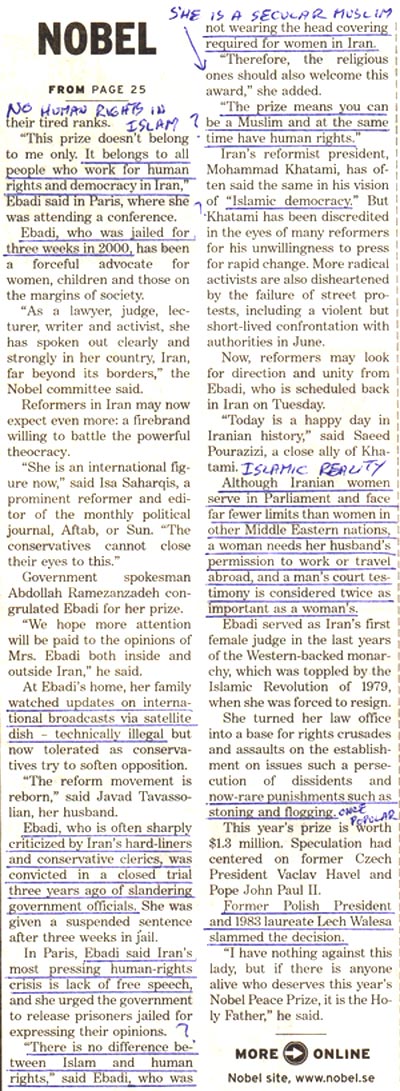
NOBEL WISHFUL THINKING


The Real Story on the late Dr. M.A. Zaki Badawi, KBE
by Dr. Richard L. Rubenstein, Robert O.Lawton Distinguished Professor, Florida State University, former university president and internationally reknown author, theologian and commentator.
I learned this week of the passing at 83 of Dr. M.A. Zaki Badawi, K.B.E., (Knight Commander of the British Empire), and the most influential Muslim religious scholar in Great Britain. His was a career of extraordinary achievements, the details of which are available from the obits of the Guardian , the Times (UK) Aljazeera.net and many other sources. Among those who praised him when learning of his passing were Jonathan Zacks, the Chief Rabbi, Rowan Williams, Archbishop of Canterbury, the Prince of Wales, and Tony Blair.
I came to know Dr. Badawi in the 1980s and early 1990s. He and his wife Mavis
attended some of the same international conferences as did I and my wife Betty.
Because of his sophistication and the range of his knowledge, Betty and I would
often sit at the same table at dinner with Dr. Badawi and Mavis. We enjoyed his
company until one day the subject of Israel came up. He said to me,”But, of
course, you know that sooner or later the Israelis will have to go” In his mind,
the matter was a foregone conclusion and discussion was out of the question.
Mavis chimed in,”Like the Crusaders” Understandably, I lost any interest in Zaki
Badawi as a dining companion.
This year I learned from a non-Jewish British friend who is a leader in the
realistic human rights movement in the UK (supportive of Israel) that Badawi had
recently told him that he had never taken out citizenship in spite of more than
30 years as the Establishment spiritual leader of British Islam. He told my
friend he remained an Egyptian citizen. He also said that he had no interest in
Darfur because those sub-Saharan Muslims were not really Muslims but
polytheists.
Dr.Andrew Bostom, author of the acclaimed The Legacy of Jihad had this revelatory quote about whether the late Dr. Badawi's loyalties lay.
"Mervyn Hiskett
(1920-1994) was an important scholar of the Hausa
(Hausa-speaking) Muslim population of Northern Nigeria and the adjacentareas of
Niger. Hiskett chronicled the jihad campaigns of Usman Dan Fodio in the early
19th century (described in
The Sword of Truth),
and in the twilight of his career, he became very concerned about both the
resurgence of jihadist thought amongst contemporary Nigerian Muslim scholars,
and the parallel intolerance of the burgeoning Muslim community in his native
Great Britain. In a chapter entitled, "Theocrats in a Secular Society" from his
1993 Some to Mecca Turn to Pray (p.235), Hiskett warned of the "ominous" sentiments
expressed by Dr. Zaki Badawi, the scholar and one time Director of the Islamic
Culture Centre of London, who had written openly about his ultimate desire to
see Britain under the Shari'a:
"A
proseletyzing religion cannot stand still. It can either expand or
contract. Islam endeavors to expand in Britain. Islam is a universal
religion. It aims at bringing its message to all corners of the earth.
It hopes that one day the whole of humanity will be one Muslim community, the Umma."
July 24, 2006
The Australian
Dr Ebadi said some Islamic countries were turning their backs on modernization and the need for democracy, and as a result were creating tensions internally.
Speaking at the Earth Dialogues 2006 conference in Brisbane, Dr Ebadi said her native Iran as well as Saudi Arabia, Kuwait and Yemen "among others" were guilty of human rights violations.
"In these countries, Islamic rulers want to solve 21st-century issues with laws belonging to 14 centuries ago," she said. "Their views of human rights are exactly the same as it was 1400 years ago.
"Undemocratic Islamic governments justify their oppressive acts by taking advantage of the name of Islam, in exactly the same way as the United States justifies its warmongering by abusing the name of democracy."
In 2003, Dr Ebadi was awarded the Nobel Peace Prize for her efforts in promoting democracy and human rights in her country, particularly the rights of women and children.
She now works as a lawyer and teaches at the University of Tehran.
Dr Ebadi, who received a standing ovation for her call for world peace, said that in her mind one could be a Muslim and also respect human rights.
"Problems arise when a group of fundamentalists close their eyes to the evolution of the world and are unwilling to reassess their value standards. They consider outside changes to be nothing but an illusion," she said.
"They have stuck with persistence to their aged traditions and look on the world through the eyes of their ancestors and wish to solve today's problems with an outdated knowledge of yesterday.
Dr Ebadi lamented "horrific" recent events in the Middle East, particularly in Lebanon.
"Peace between Palestine and Israel can only be enduring if both countries accept and recognize that two separate and autonomous states of Palestine and Israel can co-exist," she said.